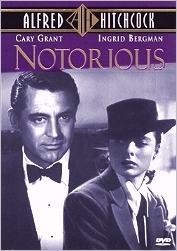 |
NotoriousSelznik |
|---|
 |
NotoriousSelznik |
|---|
|
Cary Grant - T.R. Devlin Ingrid Bergman - Alicia Huberman Claude Rains - Alex Sebastian Leopoldine Konstantin - Ann Sebastian Louis Calhern - Paul Prescott Ivan Triesault - Eric Mathis |
Alfred Hitchcock - Director Alfred Hitchcock - Producer Ben Hecht - Screenwriter Ted Tetzlaff - Cinematographer Edith Head - Costume Design Roy Webb - Film Score |
Notorious, after Shadow of a Doubt, is one of Alfred Hitchcock's best film of the forties, and it is surely one of the dozen best in his catalog. Its stars--Ingrid Bergman and Cary Grant--lend the film an immediate appeal. The complexity of its villainous characters raises unsettling questions about fundamental psychology. The way it explores the possibilities of the camera, with Ted Tetzlaff's brilliantly planned black and white photography, is a lesson in moviemaking. Hitchcock's and Ben Hecht's scenario, moreover, adds a depth and humanity manifested by few films of that era. And Roy Webb's uneasy score for Notorious is the perfect accompaniment.
Finally, the effortless use of MacGuffin and symbol in Notorious draws the audience into the possibilities of both horror and honor. Perhaps critics dislike this romance due to its curious lack, after the opening scenes, of that characteristically Hitchcockian humor. But this in no way afflicts it with "deadness" or makes it finally "boring," as John Russell Taylor states in his book, Cinema Eye, Cinema Ear. Even so, Taylor admits that "the theme is developed with extraordinary concentration; there are no irrelevant extravagances of any sort . . . and the big scenes . . . are all manages with the utmost directness and simplicity."
The story begins in Miami, as the father of Alicia Huberman (Ingrid Bergman) is sentenced for treasonous crimes against the United States. She leads a fast life, and it is clear that she has a drinking problem. Alicia is approached by an American agent named Devlin (Cary Grant), whose first name the audience never discovers. He offers her a job as a counterspy in Brazil, working with Americans under Captain Paul Prescott (Louis Calhern) in an effort to discover secrets former Nazis connected with a man named Alexander Sebastian (Claude Rains).
Alicia and Devlin fall in love, but he is unwilling--and unable--to stop her further advantageous involvement with Sebastian, whose devotion to Alicia is clearly unreciprocated. Sebastian marries Alicia, a step applauded by American authorities as a better way to gather information. Eventually, however, Sebastian and his mother (Leopoldine Konstantin) find out that Alicia is their enemy. Their attempt to poison her is almost successful; Devlin rescues her, and Sebastian is left to explain these strange occurrences to his colleagues.
Although Notorious seems to be a spy melodrama, in fact it is not. The espionage activities are really Hitchcock's MacCuffin, his ubiquitous pretext for more serious, abstract issues. Here, the serious issue is one of common humanity--the possibility of love and trust redeeming two lives from fear, guilt and meaninglessness.
Hitchcock breaks open this cliche, turns it inside out and so makes clear its pristine meaning (for every cliche is a truth that has become ignored through overuse). In the case of Alicia Huberman, the issue is the possibility of a life transformed from a pattern of alcoholism, frenetic sensuality and neurotic guilt for her father's crimes against America. In the case of Devlin, it is the possibility of liberation from his acknowledged fear of women and the development of the capacity to show affection. These are problems common to very many people, and they are the major themes of the film. Spies and uranium provide the dramatic context. They get the audience into the theater in the first place and keep them entertained as a deeper moral fable unfolds.
After more than twenty-five years, Notorious remains an irresistible film. The performances are altogether controlled and credible, the photography and script are supremely economical and modulated, and Hitchcock's direction is consistently crisp and unselfconscious, (A brilliantly photographed scene is the justly famous crane shot from the grand staircase of the Sebastian home, past the guests, down to the foyer and finally to the key gripped in Alica's hand. Shot in one unbroken take, it is remarkable for its fluidity and its provocative richness. It is very like the panoramic approach to the drummer with the twitching eye in Young and Innocent, a decade earlier.)
Notorious is a rare kind of romantic thriller whose eminent humanity and style continue to win wide audience appeal. It is Alfred Hitchcock's own version of what may happen when people blithely go "flying down to Rio."
--DONALD SPOTO, from
The Art of Alfred Hitchcock
A selection of Notorious related films.
|
Find Notorious on eBay.com
A selection of Notorious books.
|
|
home: The Film Noir 'net |
back: forward: FILM LIST CLASSIC NOIR |
|
Any comments, additions or suggestions
should be adressed to: The Film Noir 'net / Eric B. Olsen / ericbolsen@juno.com |
Other Web Sites:
History of Horror Hard Bop Homepage The War Film Web Author Eric B. Olsen |